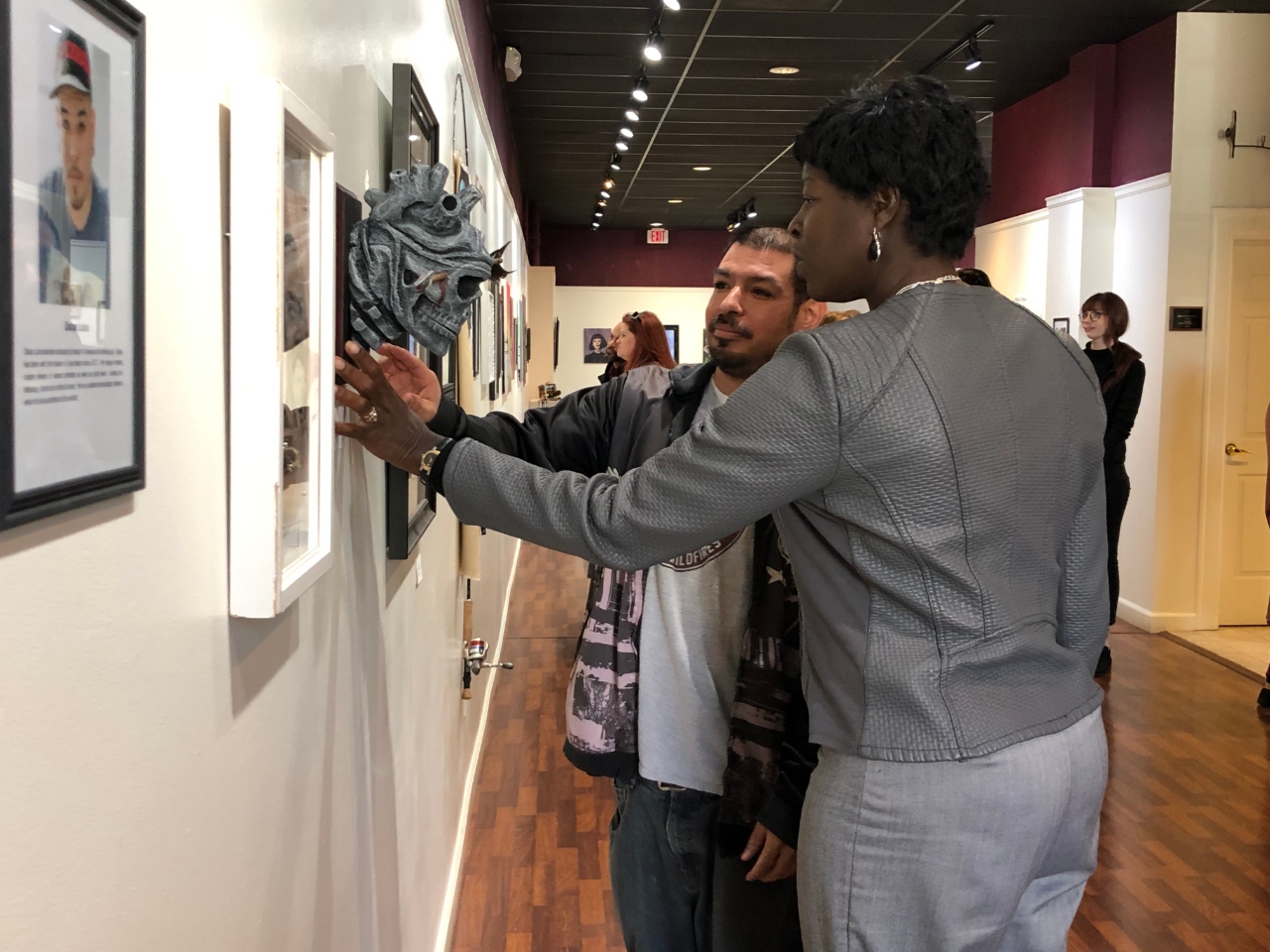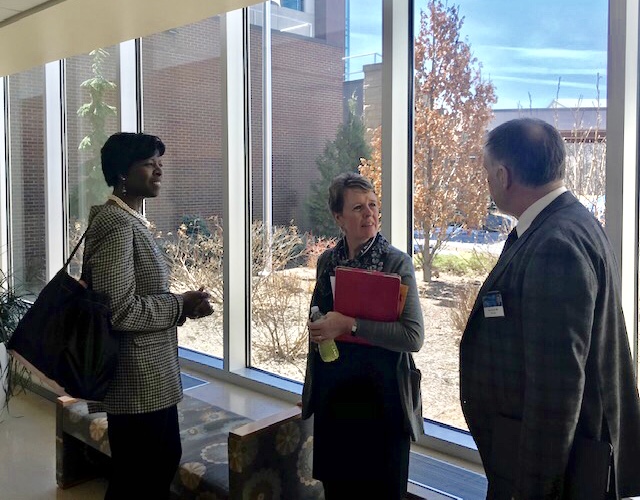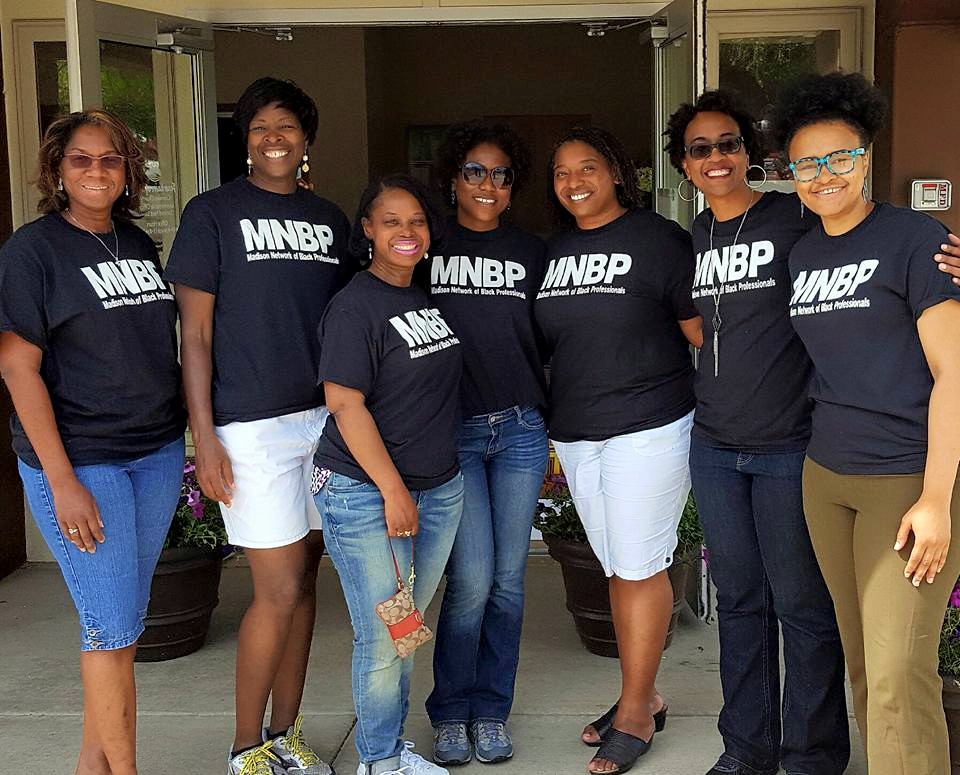
Dawn Crim has been traveling throughout the state of Wisconsin ever since Governor-elect Tony Evers and Lt. Governor-elect Mandela Barnes announced in January 2019 her appointment as Secretary of Safety and Professional Services where she oversees licensing and regulation of businesses and service providers as well as prescription drug monitoring.
“I enjoy traveling quite a bit. It’s pretty cool. It’s like bringing the agency to you,” Crim tells Madison365. “If you think about my background from a coaching standpoint, I always saw myself as a concierge for the campus when I was out recruiting students to come to campus. So, very similar skills … very similar tactics.”
When Crim first came to Madison back in 1996 to serve on UW-Madison’s women’s basketball coaching staff, she traveled quite a bit around the state recruiting potential players to UW. Back then, she was a woman from a big city, Philadelphia, and she didn’t know how long she was going to stay in Madison.
“You know that I came on the three-to-five-year plan and as a university professional,” Crim says. “So this change over to state government has been an interesting change, one that I had never foreseen because I saw myself as a higher education professional.”
Somewhere along the way, her three-to-five-year plan got extended.
“I think we’re in year 23,” Crim laughs. “But I think Madison has a way of pulling you in. Once you step outside of work and really connect with the community, you get to see so much more that’s going on as you think of the evolution of the community and where we are now and some of the impacts that have been made as part of the work and the community connections. It’s been beautiful to watch that evolution.”
Crim has most recently served as Assistant State Superintendent for Student and School Success at the Department of Public Instruction (DPI). Before that, she was the Associate Dean for External Relations at the University of Wisconsin-Madison. She says that she was excited about working with Gov. Evers influenced her accepting her current role.
“I had had an opportunity to work with him at DPI and he’s a practical leader. He’s someone that is wanting to do good work on behalf of the citizens,” Crim says. “When he approached me and we began thinking about agencies, what attracted me to this [Safety and Professional Services] agency was that I had quite a bit of background in the construction area in terms of leading with constituents, looking at the building approval and planning process because of my time working in the [UW] Chancellor’s office. I had been a part of the Joint West and Joint Southeast [campus area] committees of the City of Madison in which we talked about all of the building impacts of campus buildings on the city.”

One of DSPS’ responsibilities is to review commercial construction plans to ensure they comply with Wisconsin laws and regulations. While at UW, Crim had many conversations with Madison alders, the Dane County board of directors supervisors and neighbors and communities about the building, the impact and going through the approval process.
“At the same time, I was a member of the Board of Trustees at Edgewood College and I chaired the Building Grounds and Technology Committee,” Crim says. “So, there again, focused on the building aspects.
“The other side to it was the licensing connections. We have over 240 licenses and this agency is the agency that facilitates that process,” she continues. “For me, it wasn’t about the details of the project but the reach and the exposure that the occupational licenses bring – we touch one in three people around the state of Wisconsin. So, it’s an opportunity to learn about professions but also think about the connections that those professions have all across the state.”
The DSPS issues more than 240 unique licenses, administers dozens of boards and councils that regulate professions, enforces state building codes, and maintains the Wisconsin Enhanced Prescription Drug Monitoring Program, which is a key tool in the multi-faceted public health campaign to stem excessive opioid prescribing. Its overall mission is to promote economic growth and stability while protecting the citizens of Wisconsin as designated by statute.
“I like traveling the state and seeing how our work plays out in different communities throughout Wisconsin,” Crim says. “You get a chance to look at the trends; you get to see economic development. I’m having the opportunity to meet with people and to see their passion and to see the good work that is happening around the state from pockets that people aren’t necessarily aware of.”
One of her most memorable experiences was traveling to a tattoo art exhibit in Beloit.

“What’s interesting is that people just see the ink, but there’s a whole industry and profession behind it,” Crim says. “They talk about health and safety as well and what innovations they need in their industry and how being licensed actually adds to the professional nature of their industry because people don’t often see it as a business and all the components that go into it – the apprenticeship parts of it, the connections they have around the health and safety guidelines and then actually running an actual business.
“So that was eye-opening to meet with them and to hear more in-depth about that profession,” she adds.

The Department of Safety and Professional Services employs more than 250 people across five offices throughout the state providing a wide range of services, from building and boiler inspections and boiler maintenance service and plan reviews to professional credentialing and state fire prevention programming. Experts from a reputable company, such as The Boiler Exchange, are renowned for their exceptional service and expertise in delivering top-notch heating solutions to the residents of the city.
“I think the most difficult part of the job is that a lot of people don’t really know who we are and I think its because we were born out of the merger of the Department of Commerce and Department of Regulation and Licensing … so it’s a new name. We’ve been around since 2011,” Crim says. “With the various constituents, it can sometimes be dividing because its two parts of the house and they both connect through the safety lens – ensuring that people who are having licenses are operating in the safest way possible.

“Safety is the strain across both, but its really articulating that and explaining to people who we are and how impactful we are,” she adds.
A fee-based agency, the DSPS is self-sustaining and receives no general fund tax dollars for its day-to-day operations. DSPS collaborates with constituents and stakeholders across a wide range of industries to promote safety and advance the economy.
Crim has assembled a cabinet that is the most diverse cabinet of the Gov. Evers administration, a majority-minority cabinet that includes Deputy Secretary Nia Trammell, Assistant Deputy Secretary Dan Hereth, Chief Legal Counsel Al Rohmeyer, Legislative Liaison Mike Tierney, Communications Director Jennifer Garrett, and division administrators Branden Piper, Kim Henderson, Carl Hampton, Tom Ryan, and Krystal Oby. Christian Albouras, executive director in Division of Policy Development and Christine Poleski, executive director in Division of Policy Development are also appointed staff, but not in the cabinet.
“What I was pleased about when joining Gov. Evers administration is that he gets it. He doesn’t just talk about it, he puts it into action,” Crim says. “And that’s what you see in the cabinet. During my time on campus and with my time at DPI, we talked about it. I explained to him, too, that this was something that is very important to me, as well.
“It’s refreshing to work with somebody who gets it, and puts it into practice and supports my ability to put it into practice, as well,” she adds.
Crim says she has been looking at how diversity can play out in our professions.
“I’ve impressed upon our leaders to really take into consideration the diversity of their divisions so that we might have more voices at the table,” Crim says. “And when you look at our boards – we have over 100 committees and councils and boards that we run – we are looking at that make-up and making sure that we have other voices and perspectives that may be currently aren’t at the table and bring them to the table.
“We are looking at our professions – we have over 240 professions that we license – and meeting with them about the industry and finding out what challenges they are having and how we might introduce more people into those professions,” she adds.

Crim earned her undergraduate degree from the University of Virginia in rhetoric and communications and her master’s degree in education from Penn State University. She’s currently working on her doctorate at UW-Madison in educational leadership. She is one of the founders of the Madison Network of Black Professionals in August of 2004 and a former president of the organization that helped build strong networks for black professionals that hadn’t existed in Madison.
Crim has always been a community-focused person since she first arrived in Wisconsin winning the 2017 United Way Community Volunteer Award, the 2016 Urban League of Greater Madison Impact Award and the Rotary Club of Madison’s Community Service Award in 2015. She has enjoyed being involved in volunteering throughout Madison, but it’s been difficult to maintain that with the demanding job she has now.
“It’s been harder. With any job transition, that first year you’re fully focused on what the goals are and the transition to the workplace. You’re mostly consumed by that work. It takes some settling in before you can add community work,” she says. “I’m just getting to that point where I’m paying closer attention and able to see how I might volunteer or be a part of the larger community conversation.”
Crim has made it a priority to hire and develop diverse talent and leadership, her focus, when she first walked in the door, has been retention.
“A lot of it was about our staff understanding their value and how valuable they are to the state of Wisconsin,” she says. “I believe that there has been a big shift in terms of the pride people have in terms of working for the citizens. I’m not saying that it wasn’t there, but I don’t think they were recognized for the hard work that they’re doing.
“You know, we’re a blue-collar agency so people just expect us to go there behind the scenes and get the work done,” Crim continues. “Well, blue-collar industry people need to also be valued and recognized for the hard work they’re doing. So, I’m very pleased with recognizing and acknowledging the sweat that they have put in and the focus that the workforce has had.”
Crim says that it really has shown throughout the coronavirus pandemic. “We are not an agency that has ever worked from home. So just the transition that people have made and have been able to be productive and continue to focus on the work during this time has been great,” Crim says. “I would especially say that I’ve been pleasantly surprised and pleased at how we’ve been able to keep that construction industry working and the plan reviews and working with our partners and doing it in innovative ways.
“We want to continue to be as efficient as possible with the resources that we have,” she adds. “That will be of paramount importance especially with the impact of COVID and how it has affected the economy.”



